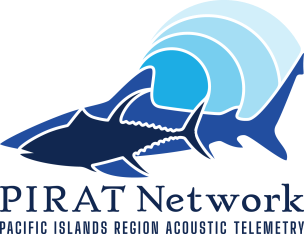The PIRAT Steering Committee

Thomas Tinhan, Ph.D.
Committee Chair - PIRAT Node Manager, Pacific Islands Ocean Observing System
Tom leads the PIRAT Network, coordinating data loading activities, training for new members to the network, and leading outreach efforts to identify new datasets, and new opportunities to build capacity for acoustic telemetry in the Pacific Islands. Tom’s background is in the complementary use of natural tracers and electronic tagging techniques to answer questions about the migration of marine fishes, their ecological roles, and how these might shift as a consequence of environmental variability.

Melanie Hutchinson, Ph.D.
Senior Bycatch Mitigation Scientist, Inter-American Tropical Tuna Commission
It's thanks to Melanie and Molly Scott (below) that PIRAT exists, so we like to keep them involved in the decision making. Melanie also lends important perspective on where broad-scale animal movement datasets, like those supported by PIRAT, are most useful in the Pacific.
This knowledge was hard-won over years of experience working in the region - Melanie started her career as a longline fisheries observer and has since worked to reduce the negative impacts of fishing on vulnerable species. She uses different telemetry technologies to understand vulnerability to capture and to generate quantitative estimates of post release survival rates for purse seine, longline and small-scale fisheries targeting tuna and associated species across the Pacific Ocean.

Molly Scott, Ph.D.
Fisheries Bycatch Researcher, Hawaii Institute of Marine Biology
In addition to helping establish PIRAT, Molly is a fisheries bycatch researcher from the University of Hawaii. Broadly, she is interested in the impacts of climate change and fishing practices on the movement, behaviour, and physiology of target and non-target fisheries species. She is extremely excited that the PIRAT node is up and running and looking forward to collaborating with other telemetry researchers throughout the Pacific to expand listening arrays and analyze movement and behavior data from marine animal telemetry studies across the Pacific Ocean basin, with the aim to assist fisheries managers to make informed decisions for the protection and sustainable use of fisheries and associated bycatch throughout the Pacific.

Mark Royer, Ph.D.
Postdoctoral Researcher, Hawaiʻi Institute of Marine Biology
Mark is a postdoctoral researcher at the HIMB Shark Lab, where he investigates the behavior and physiological ecology of sharks. Mark has done (and does) a lot of tagging work in the Pacific Islands, and has a great insight into how a collaborative node like PIRAT can serve the needs of researchers in the region.
He earned his Ph.D. from HIMB in 2020, with a dissertation focused on the thermoregulation, activity patterns, and behavior of sharks that migrate daily between dramatically different thermal environments. Throughout his graduate studies and in his current role, Mark has contributed to numerous telemetry projects through the HIMB Shark Lab, tracking shark movements across the Hawaiian Archipelago and beyond. He also served as a research assistant with the Hawaiʻi Community Shark Tagging Program.

Shannon Landovskis
Field Operations & Data Acquisition Coordinator, Ocean Tracking Network
For the Steering Committee, Shannon is something of a liaison between PIRAT and the Ocean Tracking Network (OTN), and she provides a valuable, in-depth perspective on the data management practices of PIRAT.
At OTN, Shannon is responsible for metadata quality control and assurance, providing support and training for new and existing nodes and early career researchers, and the occasional bit of field work! She received her Bachelor of Environmental Studies from the University of Waterloo and her Master of Science in Biology from Dalhousie University.

Julie Hartup
Julie obtained her degree in Zoology from Brigham Young University and was a research diver and teaching assistant for their marine biology program held at Hopkins Marine Station in Monterey California. Julie completed several internships at the Monterey Bay Aquarium in Water Quality, Visitor Presentations, and Tuna Research Center. After moving to Guam in 2007 with her husband Dr. Jason Hartup and four children. Julie began working on her master’s degree at the University of Guam. Julie came across a new undocumented feeding behavior of the reef manta ray, targeting reef fish spawning aggregations to feed off fish eggs. Julie trained in the Maldives with the international NGO Manta Trust Founder Guy Steven, and later became Manta Trust Project leader for the Federated States of Micronesia, and the Marianas Islands. Julie is also a board member and scientist for Hawaii Association for Marine Education and Research. Currently, she has expanded her area of study on manta rays throughout Micronesia such as: Northern Marianas, Yap, Outer islands of Yap-Ulithi, Pohnpei, and Marshall Islands. Starting in 2015, Julie Hartup along with follow scientist Jennifer Cruce created Micronesian Conservation Coalition with extensive help and assistance from Whitney Blandford and Carlotta Leon Guerrero, co-founder and Director of Ayuda Foundation.

